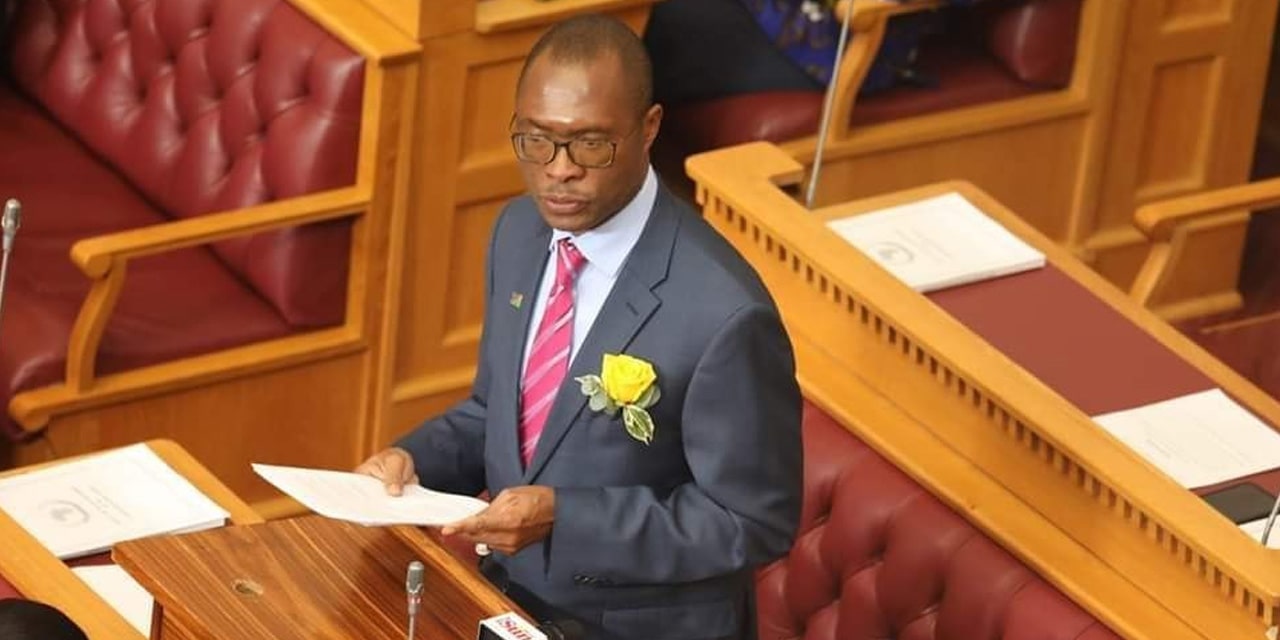Andrew Kathindi
The national budget for the 2021/2022 financial year amounts to N$59.4 billion, Finance Minister, Iipumbu Shiimi, has announced.
This is a 6.1 percent decline from the N$63.4 budget tabled last year. “Budget revenue is projected to decline by 6.1 percent to N$52.1 billion, from the estimated N$55.5 billion in 2020/21. This is largely due to the expected contraction in SACU receipts. Over the remainder of the MTEF, revenue is forecast to gather pace at an average rate of 4.8 percent as domestic economic activity and regional trade pick up,” said Shiimi.
Of the tabled figure, N$53.9 billion is operational and N$5.6 billion, which is 3.0 percent of the GDP, is earmarked for development.
Ministry of Basic Education, Arts and Culture was the biggest ministerial receiver of the budget with N$13.8 billion. The Ministry of Gender Equality, Poverty Eradication and Social Welfare is allocated N$5.4 billion, equivalent to 9.2 percent of the total allocation. According to the minister, this was “mainly to fund the social safety net programmes and also to support the fight against Gender-Based Violence.”
The Defense and Veteran Affairs Ministry was allocated N$5.4 billion, about 9.1 percent of the total allocation ,representing a reduction of N$800 million or 12.8 percent mainly attributed to the funding of COVID-19 measures.
This comes as economic and political analysts have previously questioned why Government has allocated the Defense Ministry a high allocation of the budget, in the past.
Meanwhile the Ministry of Health and Social Services (MoHSS) was allocated N$8.1 billion.
“This is 13.6 percent of the total non-interest expenditure to, among others, support the national response on COVID-19, the associated roll-out of the vaccination plan, acquisition of pharmaceuticals and continued provision of services countrywide,” said the Finance minister.
The country on Tuesday received a donation of 100 000 doses of the vaccine from China. “The advent of the COVID-19 vaccine presents an opportunity to transit to the next phase of the new normal and reinvigorate the return to increased economic activity,” said Shiimi.
The country’s public debt, according to Shiimi, is expected to rise to about N$140.8 billion or 76.2 percent of GDP in 2021/22, “and would remain elevated over the Medium-Term Expenditure Framework (MTEF). Debt is projected to stabilize at about 84.6 percent in 2025/26.”
“The Namibian budget deficit is running at 7.3 percent this year, however is still shallower than the SA deficit. Debt levels are moving higher in lockstep. It appears N$15 billion budget deficits is the new norm. Last year N$13 billion was the new norm. Government is looking to raise N$48.4 billion from the domestic market over the next three years. That is a 63.8 percent increase. Changes to local asset requirements on the cards,” co-founder of Cirrus Securities Rome Mostert said in a tweet.
Namibia’s revenue for the past financial year, according to the budget, amounted to N$55.5 billion, 7.9 percent above expectations. According to Shiimi, the output in the beverage and transport sub-sectors declined by 24.9 percent and 17.1 percent respectively.
“Industry sub-sectors, which are at the epicentre of the pandemic-induced disruptions, bore the brunt of the hit on activity. As such, the hotels and restaurants industry sub-sector is estimated to have contracted by 70.2 percent, and diamond and basic metals processing contracted by 39.4 percent and 42.8 percent respectively, owing to the fall-out on external demand.”
All major industry sectors are forecast to post a moderate positive growth in 2021 relative to the sharp contraction in the past year, said the Finance minister.
The minister further revealed that Government would not be increasing general tax rates in an effort to not stifle economic recovery.
“In this context, the tax policy and tax administration reforms will aim to strengthen the fairness and equity principles of the tax system and achieving greater compliance through effective tax administration.”
Taxes on alcoholic beverages, nicotine and tobacco products were, however, increased. It will now cost an extra 14c for a 340ml can of beer or cider, while a 750ml bottle of wine will costs an extra 26c.
“A 750ml bottle of sparkling wine attracts an extra 86c. A bottle of 750 ml spirits, including whisky, gin or vodka, has increased by N$5.50c.”
Smokers will also feel the pinch as a packet of 20 cigarettes will cost an extra N$1.39c; 25 grams of piped tobacco now costs 47c more, and a 23-gram cigar is now N$7.71c more expensive.




